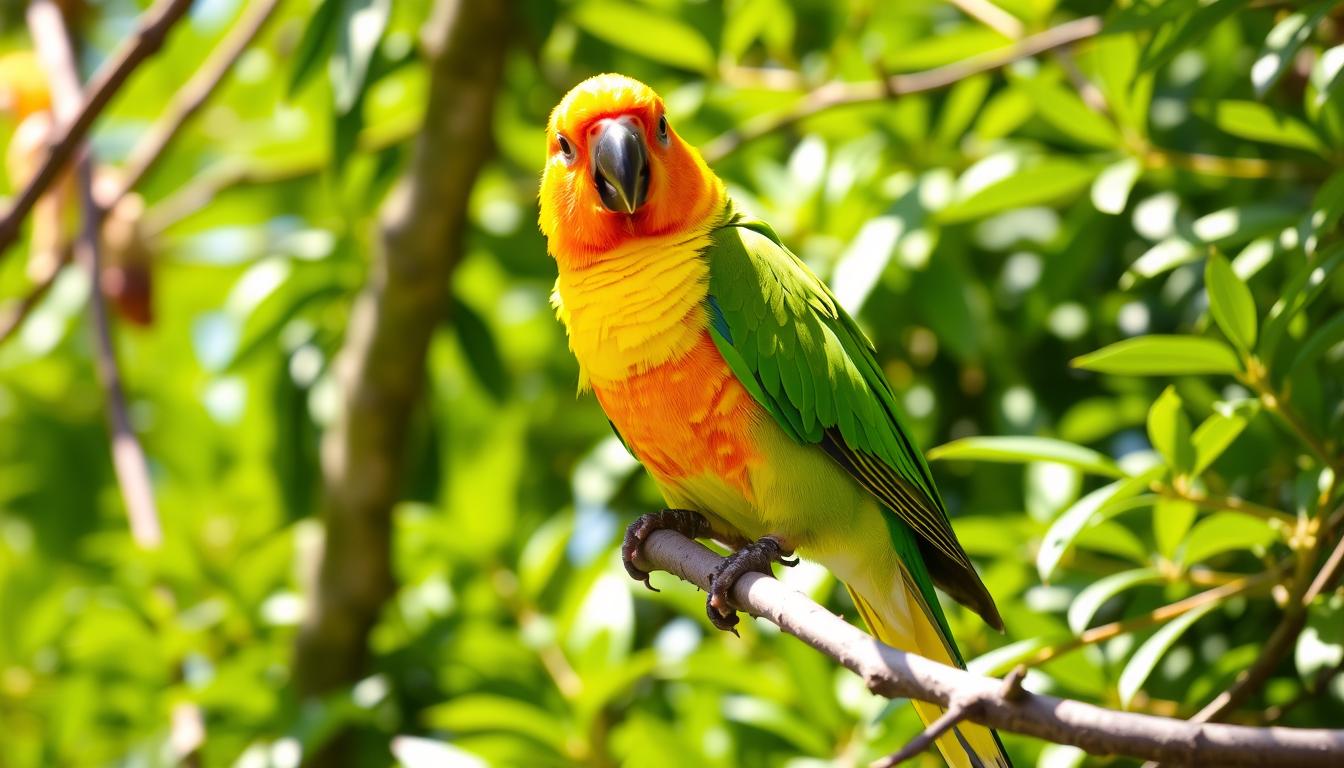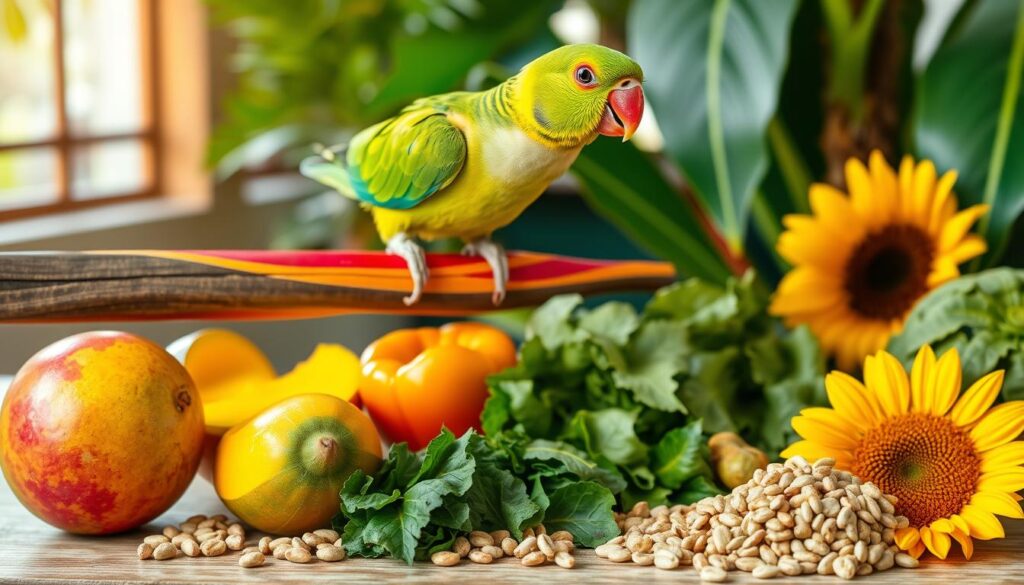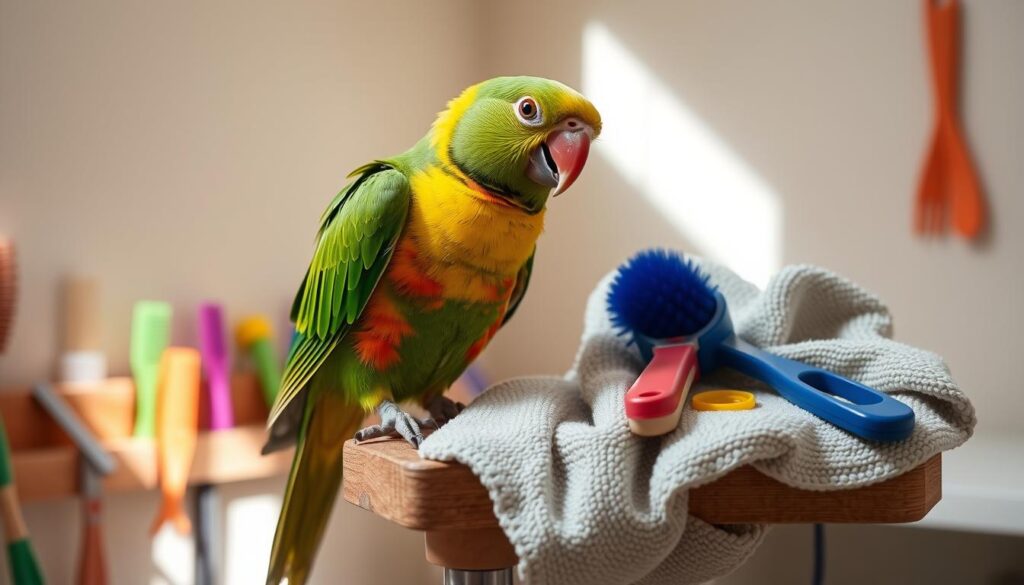Discover the Joy of Conures: Colorful Companion Birds

The Sun Conure is a standout in the bird world. It changes color dramatically from a young bird to a stunning adult. These birds are not just colorful; they bring joy and energy to any home1.
Female yellow-sided green cheek conures are known for their friendly nature. Male conures can be more varied and sometimes a bit bossy. But all conures have a special charm that draws people in.
Key Takeaways
- Sun Conures celebrate a magnificent color transformation from juvenile to adult stages.
- Female green cheek conures are known for their uniformly pleasant demeanors1.
- The diverse personalities of conures, ranging from reserved to obsessive, mirror the spectrum of their vibrant feathers1.
- With a significant price reduction, Sun Conures have never been more accessible for potential pet owners2.
- Understanding a conure’s individual traits can lead to a more harmonious pet-owner relationship.
- Selecting a conure as a companion offers a unique blend of visual beauty and interactive engagement.
- Recent pricing adjustments make a variety of conure species, including the coveted Golden Conure, a more attainable choice for pet lovers2.
Embracing the Sun Conure’s Vibrant Beauty
The Sun Conure is more than a pet; it’s a moving art piece. Its Sun Conure appearance is striking, showing off avian beauty. As it grows, its feathers change from green to bright orange and yellow, a sight bird lovers look forward to.
Looking at the conure colors, it’s easy to see why they’re loved. Their color changes as they grow, keeping their look fresh and exciting. This change mirrors life’s dynamic nature, making each stage unique and thrilling to watch.
Understanding Sun Conures means knowing how each color phase marks a stage in their life. Their colorful journey shows the detailed process of their growth. This is similar to caring for pets like Toy Fox Terriers, which also require dedicated attention.
Sun Conures are more than their looks. They show us that beauty evolves and changes, reminding us to appreciate its many forms. Their beauty enriches our lives, making them a wonderful addition to any family.
Admiring the Sun Conure appearance also makes us think about our own views on beauty. It shows us the value of change and growth in nature. Their vibrant presence adds joy and beauty to our homes and hearts.
The Endearing Personalities of Conures
Conures are loved for their bright colors and friendly nature. These sociable parrots are always the center of attention. Their lively and curious behavior makes them wonderful affectionate companions.
Life of the Party: Social Butterfly Qualities
Many conure species, like sun conures and green cheeked conures, are known for their lively social nature. They love to interact and entertain, showing off their sociable parrot reputation3. But, some like sun conures might get loud if they don’t get enough attention4.
Playfulness and Affection: Bonding with Your Conure
To bond with conures, you need to understand their need for touch and mental play. This builds a strong connection. These affectionate companions love to cuddle and seek warmth from their humans. But, green cheek conures can nip if not trained right4.
Learn more about the playful and sociable nature of conures. By engaging in conure care like positive reinforcement, you can handle their loud morning calls and messes4.
Understanding conure care and enjoying their playful antics makes every day special. A happy conure feels loved, engaged, and part of the family!
Splendid Sounds: Understanding Conure Vocalizations
Conures are not just beautiful to look at; they also have amazing vocal abilities5. They use different sounds to show their feelings and needs. For example, they whistle when they’re happy and squawk when they’re bored or upset5.
Knowing what these sounds mean can make your bond with your conure stronger. It’s like having a special language just for the two of you.
Conures make different sounds for different reasons5. A happy conure might grind its beak or purr softly in the evening5. This shows they feel safe and happy. But, if a conure screams a lot, it might be warning you of something or wanting attention5.
Learning about conure sounds can be really interesting. They can even mimic sounds they hear often, like laughter or songs5. Learning how to train them can help them communicate better.
Knowing when and why your conure makes certain sounds can make life better for both of you6. If you notice when they sing or whistle happily6, you can respond in a way that makes them feel good. This can help reduce stress sounds.
Creating a good environment for your conure is key. Try using different perches, toys, and soft music6. Also, having a routine that includes quiet time can help keep your conure happy and vocal.
By paying attention to your conure’s sounds and understanding them, you can make your lives better together. It’s a relationship based on understanding and respect.
| Conure Noise | Emotion/Behavior Indicated | Common Occurrences |
|---|---|---|
| Beak Grinding | Contentment | Evenings, when relaxed |
| Squawking | Boredom, Mild Anger | When left alone or ignored |
| Screaming | Alarm, Seeking Attention | Perceived danger, need for interaction |
| Whistling | Happiness, Seeking Attention | Engaging surroundings, during play |
| Purring | Happiness | When petted, post-interaction |
Nutrition for Vibrancy: The Ideal Conure Diet

A vibrant conure diet is key to ensuring your colorful companion thrives. It blends fresh produce for birds and high-quality pellets for balanced avian nutrition.
Mixing Fruits and Veggies for a Balanced Diet
To promote optimum health, fruits should be limited due to their high sugar content. Small to medium birds should eat no more than a tablespoon daily7. Darkly pigmented organic vegetables, like kale and spinach, offer essential nutrients and should be given several times weekly8.
A “salad” roughly twice the size of the bird’s head can be fed from afternoon to evening. This promotes dietary variety and avoids monotonous seed-based regimens7.
Favorite Treats: What Conures Love to Eat
Conure treats and nutritional treats should be given judiciously to not only delight but also nourish. Seeds, often high in fat, must be moderated. Grains and legumes provide beneficial protein and fiber8.
Occasional small amounts of high-quality pellets, like those from Harrison’s Bird Foods, cater to balanced nutrition. They avoid the potential harm of excessive vitamins found in some commercial brands78. Always avoid chocolate, avocado, and alcohol, which are hazardous to your conure’s health78.
Understanding these fundamental aspects of seed and grain preferences will help you maintain a healthy and happy conure. This steers clear of common nutritional pitfalls and ensures a vibrant, feathered friend8.
Creating a Comfort Zone: Housing Your Conure
It’s vital to make sure your conure has a comfortable and engaging living environment. The right home not only keeps your pet safe but also makes their life better. Here are some conure cage essentials and tips to make your parrot’s home the best.
First, pick the right cage size. For small conures, a cage of 18.3″ x 18.3″ x 22″ is best. It gives them enough room to move and feel comfortable9. Make sure the bars are 1/2″ to 3/4″ apart to stop them from escaping or getting stuck9.
Inside, use different perches to keep their feet healthy and keep them busy. You can use wooden dowels, natural manzanita, or cement perches for nail trimming9.
Cleaning is key in avian housing. Clean food dishes and water tubes at least twice a week with a disinfectant. Clean the whole cage every month9. This keeps their home clean and free from diseases.
Also, toys and fun activities are important. Conures love to play and need things to keep them entertained9. Try different toys like knots and swinging ropes. Change them often to keep them interested9.
Conures also need time outside their cage to explore and socialize. This time is good for their mind and body. Make a safe area for them to play and climb, but watch them closely9. Keep it safe from dangers like open windows or toxic plants. You might need to clip their wings and nails to avoid accidents9.
To make your conure cage even better, check out Angels Pet World. They have lots of great accessories for your avian home.
| Cage Requirement | Details | Frequency/Maintenance |
|---|---|---|
| Size and Bar Spacing | 18.3″ x 18.3″ x 22″, 1/2″ to 3/4″ spacing | N/A |
| Perches | Wooden dowels, Booda cables, natural manzanita, cement perches | Check bi-weekly for wear and tear |
| Cleaning Schedule | Food dishes, water tubes: Disinfect twice a week. Entire cage: Monthly | Use disinfecting solution |
| Toys | Various types including knots, handheld toys, large buttons | Rotate bi-weekly |
| Outside Cage Time | Play areas, minimal hazards, supervised exploration | Professional clipping to prevent accidents |
A well-set up and kept conure cage is key to your bird’s happiness and health. Use these tips to make a great home for your lively friend.
Cleanliness and Care: Grooming Your Conure

Keeping your conure healthy and looking great means regular conure grooming. A big part of avian hygiene is bathing them. You can mist them with warm water or give them a shallow dish to bathe in. This removes dirt and dust and makes their feathers shine.
By bathing them regularly, you help keep their feathers’ natural oils. These oils protect and keep them warm10.
It’s also important to trim their nails and wings. This stops them from getting too long and keeps them safe and able to move around. Make sure their cage is the right size and has bars that are easy for them to grab onto10.
Keeping their habitat clean is key to avian hygiene. Clean their cage every day and do a deep clean once a week. Change their bedding to keep their home clean and healthy. This stops bad bacteria from growing and keeps your conure happy and healthy11.
| Grooming Task | Details | Frequency |
|---|---|---|
| Bathing | Use lukewarm water spray or shallow dish | 2-3 times per week |
| Nail Trimming | Keep nails at a comfortable length | As needed |
| Wing Trimming | Prevent flight and injuries | Every 4-6 weeks |
| Cage Cleaning | Spot clean and replace bedding | Daily and weekly |
It’s also important to keep the right temperature in their home. It should be between 65°F and 80°F. This keeps them comfortable. Also, make sure they get enough UV light. Change the bulbs every six months to keep them healthy11.
- Regular cleaning prevents diseases and maintains feather care.
- Precise grooming tasks enhance the physical and psychological health of conures.
- Creating a routine for conure grooming builds trust and strengthens your bond.
In summary, a good grooming and cleaning routine is key for your conure’s health and happiness. Each step you take in their care helps them live a longer, happier life with you.
Engaging Intelligence: Training and Enrichment for Conures
Conures are known for their intelligence, making them perfect for various training and enrichment activities. Conure training can be a fun experience for both the bird and its owner. It creates a special bond and makes life more enjoyable for everyone involved.
Positive Reinforcement: The Key to Learning
Positive reinforcement is the best way to teach conures. Using treats and praise helps them learn and stay happy. Studies show that social activities can stop bad behaviors like feather plucking12.
Fun Activities to Stimulate Your Conure’s Mind
Playing with your conure keeps their mind sharp and prevents boredom. Activities like interactive toys or simple games are great for their mental health.
- Puzzle feeders are fun and challenge medium-sized birds’ brains12.
- Big birds need sturdy toys, like large wood blocks, because of their strength12.
Offering a variety of activities is key to keeping conures happy. They need social interaction to stay emotionally well. Regular social time and activities outside their cage are essential for sun conures’ mental health13.
Playtime is not just about physical activities. It also means giving them a varied diet. A mix of fresh fruits, veggies, and quality food keeps sun conures healthy and happy13.
| Enrichment Type | Benefits | Suitable for Bird Size |
|---|---|---|
| Interactive Toys | Stimulates the mind, reduces boredom | Small to large birds |
| Puzzle Feeders | Enhances cognitive abilities | Medium birds |
| Durable Materials | Meets physical chewing needs | Large birds |
| Social Interaction | Improves emotional well-being | Sun conures |
Adding these activities to your daily routine will greatly improve your conure’s life. It keeps them active and mentally sharp.
Conure Health Essentials: Preventative Care and Common Ailments
Knowing about avian health is key for Conure owners. It’s important to understand the common sicknesses that can affect these birds. With over 40 species of conures, about a quarter kept as pets, it’s vital to tailor care to your bird’s needs14. Conures are lively and playful, so they need a structured care plan for a long, healthy life.
Watching for signs of illness in your conure is the first step to prevent it. Pacheco Conure disease (PPD) is very dangerous, causing liver damage and leading to more bird deaths than any other disease15. Regular visits to a specialized avian vet are key for early detection and treatment.
Improving your pet’s health also means addressing risks from Polyoma virus and Beak and Feather Syndrome (PBFDS). The Polyoma virus mainly affects younger birds, while PBFDS can hit any age conure. This shows why comprehensive veterinary care is so important15.
As an avian vet leader says, “Preventative care through regular health checks is crucial. It helps conures live longer and better lives, often beyond 20 years.”14
To keep your conure healthy, you can:
- Keep their environment clean and safe.
- Feed them a balanced diet to avoid nutritional problems.
- Go for regular vet visits and keep up with vaccinations.
Being aware and acting early is key when dealing with conure illnesses. With the right knowledge and commitment to bird care, you can protect your feathered friend. This way, you can enjoy their company for many years.
The Social Spectrum of Conures: Interactions and Companionship
Knowing what conures need in terms of social interaction is key for anyone thinking of getting one. These birds, like the Sun Conure, love being around people and other birds.
Pet-to-Pet Interaction: Introducing Newcomers
Adding a second conure to your family needs careful planning. Start by keeping the new bird in a separate cage but where they can see each other. This helps them get used to each other without fighting16. Over time, you can let them play together, creating a fun and safe space for them to bond.
Green cheeked conures, being very social, usually get along well with others if introduced right16.
Human-to-Bird Bonding: Spending Quality Time Together
Spending quality time with your conure is more than just being in the same room. It’s about playing and training together. This not only keeps them entertained but also sharpens their minds. The guide on Sun Conures suggests using toys and puzzles to keep them busy16.
Having a regular routine of interaction is also crucial. It makes your conure feel safe and loved17.
In summary, whether you’re getting a new conure or just want to make your current one happier, it’s all about the social interactions. By engaging in activities with your bird and understanding their needs, you can ensure a happy and healthy life for your conure.
Finding Joy in Every Feather: The Unique Appeal of Conures
Conures add a splash of color and charm to the world of birds. They are perfect for anyone looking to bring a new feathered friend into their home. Knowing about the different types of conures helps you choose the right one for you.
Beauty in Diversity: The Spectrum of Conure Species
The conure family is full of colorful birds, each with its own special traits. The Turquoise Green Cheek Conure stands out with its bright blue-green feathers. It’s a rare sight that catches the eye of many.
Green-Cheeked Conures are also popular for their social nature. They live in groups, showing how friendly they can be. These birds are a joy to watch and interact with.
The Pineapple Conure is another favorite for its smart and loving personality. They grow up to 10 inches and need time outside their cage to stay happy. They are great for apartment living because they are quieter and smaller than some other parrots.
Tailored Companionship: Selecting Your Ideal Conure
When picking a conure, think about their social needs and how long they live. Species like the Turquoise Green Cheek Conure can live up to 30 years with the right care. This makes them a long-term friend.
It’s important to know about their health and take them to the vet regularly. This way, you can enjoy a happy and loving relationship with your conure.
Think about the space you have when choosing a conure. For example, Pineapple Conures need a big cage for exercise. They also need a balanced diet and positive training to stay healthy and happy.
By carefully choosing a conure, you can find a great match for your lifestyle. This ensures a happy and fulfilling relationship with these wonderful birds.
Conures are truly the best bird companions. They are smart, colorful, and full of life. They bring joy and excitement to any home.
Conclusion
The journey into the world of Conures reveals the many joys of owning one. From the Green Cheek Conure needing a big space to the Dusky Conure needing even more, the right size is key. A good diet, including quality pellets, fresh fruits, and veggies, keeps them healthy and colorful.
But it’s more than just food and space. It’s about the special bond you share with these birds. The Dusky Conure loves people, and the Sun Conure is full of energy and fun. Every moment with them is a chance to connect and enjoy their company.
Conures bring a world of color and joy into our lives. They talk, play, and even learn tricks. With a lifespan of up to 30 years, they become lifelong friends. Owning a Conure is a rewarding experience that brings endless happiness.
FAQ
What colors do Sun Conures display?
How would you describe the personality of a Conure?
What are some common vocalizations of Conures, and what do they signify?
What should a Conure’s diet consist of?
What treats are safe for Conures?
What are critical aspects of housing for a Conure?
How should one groom a Conure?
Can Conures be trained and how?
What are some enrichment activities for Conures?
What common health issues should Conure owners be aware of?
How do you introduce a new bird to a Conure?
How important is social interaction for Conures?
How do you choose the right Conure species as a pet?
Source Links
- https://forums.avianavenue.com/index.php?threads/temperament-differences-among-color-mutations.176631/ – Temperament differences among color mutations
- https://colouredfeathers.com/product-category/conure-parrots/ – Conure Parrots Archives
- http://www.goodbirdinc.com/parrot-profiles-conures.html – Conures | Training Conures | Conure Behavior
- https://forums.avianavenue.com/index.php?threads/conures-with-the-biggest-personality.189876/ – Conures with the biggest personality
- https://www.omlet.co.uk/guide/parrots/parrot_sounds/sounds/ – Parrot Sounds | Parrot Sounds | Parrots | Guide
- https://www.parrots.org/ask-an-expert/excessively-loud-vocalizations – Excessively loud vocalizations | World Parrot Trust
- https://www.orangegroveah.com/avian-diet-and-nutrition – Avian Diet and Nutrition — Orange Grove Animal Hospital – Tucson
- https://www.absoluteexoticssa.co.za/specialized-care/care-for-conures/66-the-conure-diet-plan – The Conure Diet Plan
- http://greencheekedconure.blogspot.com/2011/03/housing-your-green-cheeked-conure.html – Housing Your Green-cheeked Conure
- https://www.theposhperch.com/blogs/bird-talk/ultimate-guide-to-caring-for-your-green-cheek-conure-tips-and-advice?srsltid=AfmBOoqsLahhvcmbtioIVYHjIXoMRE9-WCH1ADHqHdgzQw0XmZ4SjN27 – Ultimate Guide to Caring for Your Green Cheek Conure – Tips and Advice
- https://www.petmd.com/bird/small-conure-care-sheet – Small Conure Care Sheet
- https://birdsupplies.com/blogs/news/6-bird-enrichment-strategies-to-keep-your-bird-busy-happy?srsltid=AfmBOopQEoKfGavxoiKshWbhxPSI3QpRsS8QjUarpggVTDVUZhUGuuNn – 6 Bird Enrichment Tips to Keep Your Feathered Friend Happy
- https://www.absoluteexoticssa.co.za/specialized-care/care-for-conures/270-enrichment-and-stimulation-for-your-sun-conure-a-guide-to-a-happy-and-healthy-bird – Enrichment and Stimulation for Your Sun Conure: A Guide to a Happy and
- https://www.petsuppliesplus.com/pet-resource-center/species/bird/conures – Conures
- https://www.parrotsecrets.com/conures/prtdld/BonusBookHealth.pdf – \f
- https://riversideaviaries.co.uk/green-cheek-conure-care-guide-in-depth/ – Green cheek conure care guide (In-depth) – Riverside Aviaries
- https://www.petmd.com/bird/sun-conure-care-sheet – Sun Conure Care Sheet


